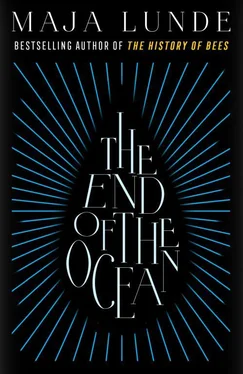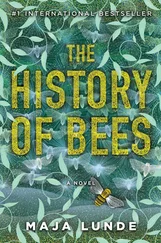“Salt is death,” Thomas said. “Salt kills.”
Towards the end, before we had to leave everything behind, I was often allowed to borrow his battered plastic boat. I would take it out on the ocean by myself, tell Anna I was going fishing, even though it was seldom possible to catch anything any longer. After docking the boat, I used to stand on the beach with my feet in the water, the water that rose slowly and relentlessly, and that was exactly what I thought. Salt is death. This ocean is death. It is rising and spreading its salt everywhere. And then I closed my eyes and prayed to a God I didn’t believe in, prayed that when I opened my eyes again and stuck my hand in the water, the ocean would have become something else. That when I tasted my fingers, it would taste of nothing, the way fresh water does. Clean, clear nothing.
Sometimes I would stand there like that. For a long while. But I never tried to taste my fingers. I just clung to the thought, to the idea that the water of the rising ocean would one day be fresh.
*
I squeezed Lou’s hand a little harder, out of a need to confirm that she was still there. We had walked quite a distance now. I turned around, could just make out the contours of the camp fence far behind us.
“Look there,” I said to Lou. “It’s nice here.”
A shadowy lane appeared on our left, with tall trees on both sides. We continued walking down it. Beneath the trees. The temperature dropped several degrees.
Lou must have felt it, that it was pleasant walking here, because now she was walking faster.
We walked around a bend. I turned my head and could no longer see the highway behind us. Ahead of us there was another bend in the road. I liked that we were alone here. That there was no longer any trace of the refugee camp. That I could pretend that we were just an ordinary father and daughter, out for a walk on an ordinary road, in an ordinary world. Like before.
We walked for five minutes, maybe ten, passed some stone houses, a small farm. In two places I saw people. An elderly woman carried a sewing chest out to a car. An elderly man took a swing down from a tree. They were headed out, packing up, trying to make their way to the north, like everyone else. Otherwise it was deserted everywhere. Abandoned, here as well.
Only traces of the people who had lived here remained. Curtains that someone had chosen, garden furniture where someone had relaxed, chimneys from which smoke had risen, a garden rake that had drawn careful grooves in the gravel in the yard, the pétanque court where the balls had landed in the sand with a crunch.
I could have lived here, I thought, even though it was far from the ocean. Here, along this lane, in this shade, I could actually have lived, this could have been my home.
Yet another house appeared, the last on this stretch of road before the forest. The house was neither large nor fancy, but nonetheless it was a palace compared to our apartment at home.
It must have been abandoned a long time ago, or inhabited by someone who couldn’t be bothered to maintain it properly. The yard was overgrown with dry weeds and the paint was peeling off the front door. There were shutters covering all the windows.
By the side of the house I spotted the lid of an old-fashioned rainwater tank. It was locked with a rusty padlock. It could be as old as the house. Was there still water in it?
Lou walked into the withering garden. It had once been overgrown, but now the apple trees were dried up and the leaves on the branches were yellow.
There was a shed with the door slightly ajar—maybe the wind had blown it open. Lou walked over and closed it. Then she turned around and pointed at something.
“What’s that?”
Behind me, far inside the garden, there was something large and tall under the dark trees, covered by several green tarps. It was long and oval, with something sticking out on both sides. A kind of stand could be discerned on the ground.
Lou tugged at me. “Come on.”
The tarps were dirty and worn, but securely attached, held in place by ropes in different pale, sun-bleached colors. Green, blue and grayish white, crisscrossing. Some of them were rotting. They had to be of cotton or hemp. But most of the plastic cords were still in one piece.
In some places leaves had gotten stuck between the ropes. The leaves had become tiny pockets of soil, where seeds had landed. From which small plants were growing. Small plants which in turn dried up and died from the drought.
We walked over to it. I reached out my hand and took hold of one of the tarps, trying to make out what it was covering.
It was soft, like there was nothing behind it, but then my fingers came up against something hard—a beam? I slid my hand upwards. The first beam met another under the tarps and something was resting on them, something enormous, heavy. And then suddenly I knew.
“It’s a boat,” I said.
A boat on a stand, in a garden, miles away from the ocean.
It must be big.
I started from behind and paced it out.
At least ten meters long.
And tall. At least three meters from the keel to the top of the cabin.
“Can we take off the tarps?” Lou asked.
*
The knots were hard between my fingers. I struggled to undo one after the next. It was as if the wind and the weather had helped tighten them.
Lou helped out, too, but most of the knots were too difficult for her. We had nothing we could use to cut the ropes and, besides, I didn’t want to destroy them. We were going to cover the boat again later, after we had seen it. We just needed to take a look. Nobody would notice.
I wound up the ropes carefully as I undid them, into huge coils that I laid side by side on the ground in the dry grass.
Lou moved them around, started sorting them by color. The blue ropes in one pile, the green in another. She could report that there were seven ropes in all.
My fingertips were sore and the palms of my hands raw by the time I had finally untied all the knots. The tarps hung in place by themselves. Four of them. I pulled them off and they slid across the hull with a sweeping sound as they dropped to the ground.
It was a sailboat. The mast lay on the roof of the cabin. The hull was dark blue, like the ocean in the evening, and there were four windows on each side.
It rested on a stand made of unpainted wooden beams, handmade from the looks of it, but solid.
There was a ladder lying over two crossbeams, a half-meter above the ground, as if it belonged there.
I pulled it out. Aluminum, with paint splotches, but all in one piece and lovely. I lifted it up onto one end, placed it on the grass and leaned it against the side of the boat.
“Are you going to climb up?” Lou asked.
“We have to, don’t we?” I said.
“Is it allowed?”
I smiled.
“Do you see anyone we can ask?”
She looked around. “No.”
“Do you think I should do it?”
“I don’t know. You decide.”
“You decide, too,” I said.
“Oh.”
“Should I do it?”
“Yes. If you want.”
I adjusted the ladder, pulling it a little further out so the approach angle was less steep. Then I stepped on the first rung.
The second.
The third.
The stand under the boat protested, creaking loudly. A tiny jerk shuddered through the entire structure. I stopped.
“Daddy?”
Maybe it wasn’t as solid as it looked. Or maybe it had something to do with the structure? I tried one more step.
“Daddy, maybe you shouldn’t do it after all?”
“It will be fine,” I said.
But it wasn’t, I could feel the impact of my steps reverberating through the stand, like I was in the process of tearing it down.
Читать дальше










